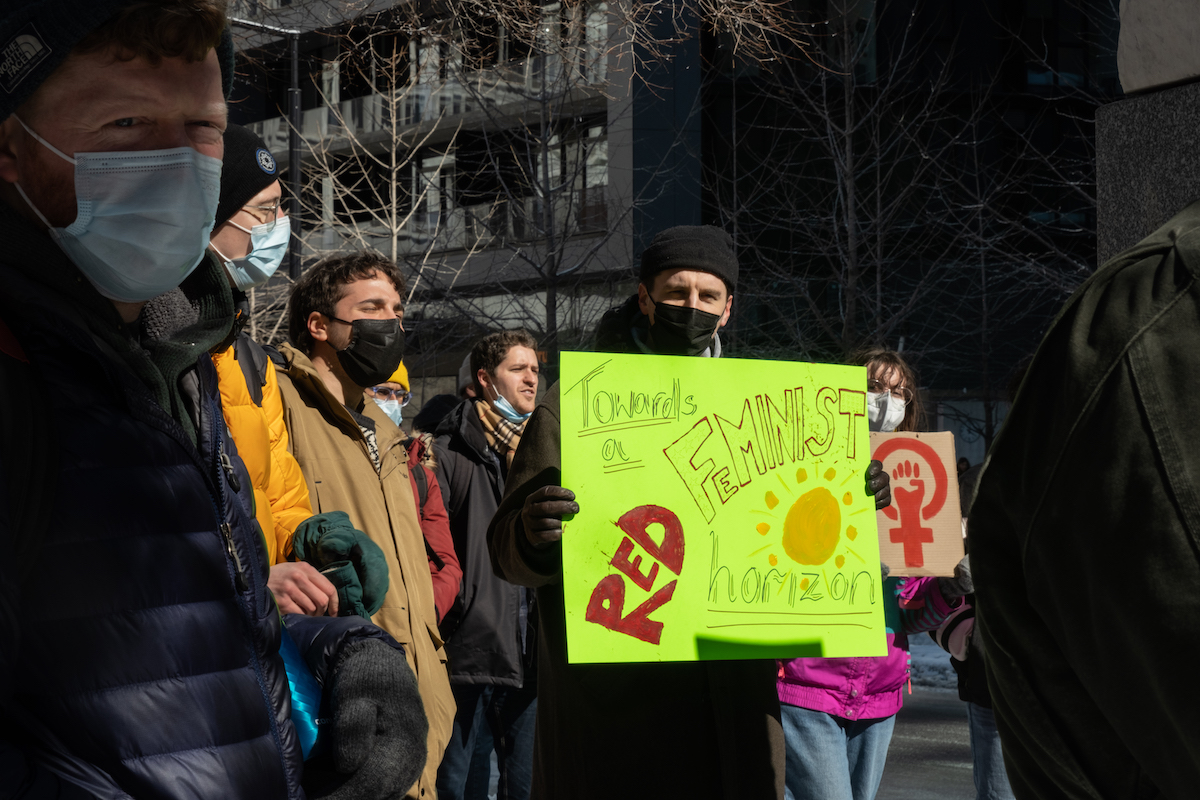Concordia’s teaching assistants union and students gather to protest against a lack of transparency in sexual violence cases, aiming to spread awareness
“When women’s rights are under attack, what do we do? Stand up, fight back!” That’s how protesters made their voices heard at the “Stand up Against Harassment” protest on March 8, International Women’s Day. The rally, held by the Norman Bethune statue, was intended to highlight the importance of acknowledging the lack of transparency in Concordia’s response to sexual violence and demand structural change.
The Teaching and Research Assistants at Concordia (TRAC) union organized the event, aiming to spread awareness and demand change regarding sexual violence victims who have been subject to Concordia’s treatment towards people suspected of committing sexual violence. Mya Walmsley, a TRAC delegate from Concordia’s Department of Philosophy, started her speech with a chant, enforcing the rally’s message for change, saying “We want change! When do we want it? Now!”
One of the reasons for the protest was philosophy students refusing to work with an unnamed professor in the department, who has an alleged history of sexual harassment. Until safer working conditions are set in place, the TAs and students refuse to work with him.
Late last year, the TRAC union created a petition, with 250 signatures, demanding from the university to be more transparent about cases of sexual assault and violence.
Concordia has been involved in six sexual allegation cases, from multiple departments, with one case dating back to the 90’s. In addition, from 2012 to 2018, six former Concordia students filed complaints to the Human Rights Commission about Concordia’s lack of response towards its students surrounding sexual violence cases.
“For a decade, the university has known about these allegations, and rather than working with survivors of sexual harassment, rather than working with students and staff to find a long-term solution, Concordia has swept these issues under the rug,” Walmsley explained.
The TRAC demands structural change to create a safer working environment, and an institutional response to sexual violence and harassment, emphasizing that sexual assault policies and gender violence must be survivor-centered, and it should never be a survivor’s responsibility to avoid the person who harassed or attacked them. Furthermore, the union demands Concordia protect survivors’ rights to tell their own stories, even if they have filed internal or external complaints. In addition, Students and TAs working and studying under the supervision of accused faculty members should be able to decide who they want to work with, or if the allegations have been dealt with satisfactorily.
Mathilde, one of the event organizers who wished to be referred to by they first name, made they stance on the topic clear.
“Today, we hold Concordia accountable for their action and responsibility towards all members of the Concordia community. We want everyone to be safe!”
Apart from the TRAC members and representatives, dozens of students and supporters joined the protest. Ra’anaa Brown, a doctoral student in the Art History Department joined the protest to show her support and draw awareness to unrecognized sexual violence at the university. “As a woman, as someone who has several sisters, as someone who knows non-binary and queer folks, this is an incredibly important cause for me,” Brown said. “Today is International Women’s Day, and it’s when women can come together across the globe, recognize our important contributions to society, but also fight for the basic human rights that we still do not have access to.”
Nelson Graves, both a master’s student and a TRAC delegate member in the philosophy department, has dedicated his time to fighting against prejudice in the Concordia administrative system. “It is a structural change. Yes, Concordia has the mandatory sexual violence course. However, someone that will perpetuate sexual violence is going to do it anyway, regardless if they have completed the course,” Graves explained. He believes that Concordia needs to enact more change, investigate how they work with survivors, and improve on transparency.
Photos by Kaitlynn Rodney




